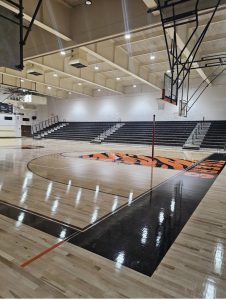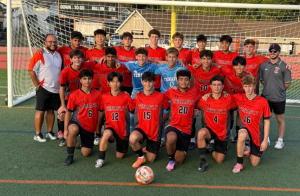Classwize: A Wise Decision?
April 21, 2023
In our digitally-dependent world, school administrators are becoming increasingly concerned about the unmonitored use of technology in classrooms. On April 4, the district announced it would be rolling out a pilot for the Classwize program, which will allow teachers to survey student activity on their devices during class time. However, this raises the question: Is this a violation of student privacy? Opinions amongst the THS community are varying.
Social studies classrooms started using the program on April 10 to test out whether it is effective to use across all classes starting the next school year. Classwize displays all the students’ desktops in little boxes for the teacher to observe. Teachers then have the ability to message students privately, control their tabs, and share their screens onto all of the student’s devices. The extension only runs during the school day on school-issued Chromebooks.
The introduction of the Classwize program feels like a natural step towards eliminating distractions during class. Theoretically, it would allow teachers to have a smooth classroom experience, without having to worry about students browsing unrelated tabs during class time. It would also give teachers the ability to create lesson plans that will be broadcasted to all the students screens, which could be an effective way for everyone to be able to view digital resources equally. Not to mention, cheating and use of programs like ChatGPT could be eliminated. “Contrary to probably most of the student body, I think that classwise is a program that can greatly benefit both students and teachers,” Grace Chung (’24), Junior Class President, said. “It ensures that when we use computers in class, we are focused and on track, which inevitably will help the students. I don’t feel like the rest of the student body should have too much of an issue with this either because as long as you are doing what you’re supposed to do in class, it’s almost like Classwize isn’t even there.”
While digitized threats to academic integrity are pressing, many Tenafly students don’t agree with the necessity for this access to their personal workspace. A common concern is the lack of privacy they will have if Classwize is implemented, as if they were to have personal information like emails open on their computer, the teacher could view them. Many also feel uncomfortable with the idea of their teachers closing and opening tabs on their computers, which feels comparable to someone continuously staring over your shoulder. In addition, many students feel that Classwize is a form of spoon-feeding, which allows students to rely on programs they will not have in the real world. “It’s up to students to make the right decision of whether they want to waste time during class or focus. By forcing Classwize, it’s not giving the students the opportunity to make the right choice,” Jocelyn Kim (’25) said.
Ms. Cutrone, the social studies supervisor who teaches AP Government and European History, clarified the use of Classwize from a teacher’s perspective. “We can’t actually see the content of your emails,” she said. “All we can see is that your email is open, and we can see the subject lines of the emails, but that’s it. The only thing we can do is close your tab; we can’t go in and start reading your emails.” Cutrone also mentioned that when a student is connected to the school’s wifi and using a school-issued computer, they don’t have privacy. “Just like your lockers are not yours and they can be searched whenever, those are not yours. You make a choice to come to school here and so you abide by the school’s policies. I don’t mean to say that to sound harsh; I mean to say that that’s just the way it is, so that’s why we’re requiring Chromebooks.” Cutrone assured that teachers don’t want access to students’ personal devices. “Even if there wasn’t Classwize, you run the risk of your privacy being violated,” she said. Teachers are also subject to the same rules.
While several students expressed that the implementation of the program felt sudden, Cutrone states that the conversation first started even before COVID. Along with many other teachers, she felt that students were getting distracted in class: “They had multiple tabs open. They were playing chess, playing snake. Some kids were watching … Netflix shows with their headphones in, and they would quickly switch to another tab when a teacher would move around the room, and quickly switch right back,” she said.
When the pandemic hit, the administration decided to pilot a different program, Lightspeed, which was not successful. “The issue with Lightspeed was it absolutely invaded students’ and parents’ privacy because it was operating on your devices when you were home,” Cutrone said. “And no teacher wants to look at what you’re doing at home, believe me.” After returning to classrooms full-time, Cutrone realized that students had grown dependent on technology. “I think all of us—adults, children, and teenagers alike, realized there was a lot they could do while doing other things on the computer. It’s a hard habit to break,” she said. “There’s this myth that multitasking is better, and there are studies that show that when you monotask, you are more efficient and it’s better quality. But it’s hard to convince students of that until they see it.”
At the end of the day, the issue comes down to the unregulated use of technology, which is neither at the fault of the teachers nor the students. People have been so accustomed to multitasking and access to endless sources of dopamine. After piloting the program at the high school, the THS administration hopes to implement it across all disciplines, and roll it out at the middle school, where students are forming foundational study skills. Hopefully, it will develop good habits in students to carry them into the real world.


















































































































































